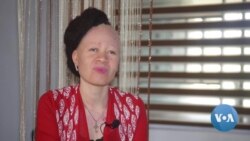Nigerian Cynthia Ukachi, who has albinism, first noticed the changes on her skin in 2018. When she went to the hospital, she was told it was an early stage of skin cancer, and that it had started because of exposure to the sun.
Thanks to a government support scheme that offered free skin cancer care for albinos, she had surgery to remove the affected areas and was treated.
However, Ukachi says the malignant skin cells returned months ago, long after the government ended its free treatment plan.
"I have three on my neck, I have two at my back and I just have this on my forehead here," she said. "It looks very small but it's very painful and it can bleed."
Without the government support, about 4 million albinos in Nigeria could be at risk of skin cancer, according to aid groups.
Too expensive for her
Ukachi says she cannot afford the treatment. Every affected skin area can cost up to $350 to treat.
"Noticing this issue again, I already knew what it was, but I couldn't go back to the hospital, knowing I'll be asked to pay, and the money is what I do not have," she said. "If the government wants me to live, if the government wants persons with albinism to live, they should reinstate the free cancer treatment.”
Nigerian authorities started the program in 2007, and the Albinism Association of Nigeria says around 5,500 patients including Ukachi benefited from it before it was discontinued for lack of funding.
Jake Epelle, a skin cancer survivor and AAN’s president, said, "Even the current administration started the skeletal implementation at the beginning of their tenure but then reneged. The reason is simply the poverty of funds and the fact that they cannot continue to offer this treatment. The effect is that persons with albinism are dying in droves.”
Medical experts say albinos in sub-Saharan Africa are a thousand times more likely than the general population to develop skin cancer because of the partial or complete absence of melanin, a pigment responsible for eye, hair and skin color.
In Nigeria, myths and discrimination associated with the condition make it far more difficult for albinos to get jobs and afford skin cancer treatment.
Authorities respond
This month, during a national awareness day to remember people living with albinism, AAN renewed its call for the government to reinstate the free skin cancer treatment.
Nigerian authorities responded. James David Lalu, executive secretary of the National Commission for Persons with Disabilities, said, "We had discussions with the permanent secretary of the federal ministry for health for us to be able to revisit this. We're going to provide some funding support to do that. Additionally, by next year we're going to provide proper budgetary allocation that will support this cancer treatment for our people."
AAN cautions there is no time to lose as free treatment is the only lifeline for people around the country like Ukachi, who fears she will run out of time.





